White House Press Secretary Karoline Leavitt provided a big update this week as President Donald Trump’s proposed tariffs are set to take place.
During an interview on Fox News, Leavitt spoke with hosts John Roberts and Sandra Smith about Trump declaring reciprocal tariffs will apply to all countries, not just the 10 to 15 that have the largest trade imbalances.
Smith asked Leavitt: “As we look at the overall tariffs situation it’s caused some uncertainty and President Trump does seem like he’s going full force ahead with all of this, talking about liberation day is coming so the UAW president said they support the tariffs as a tool but says other things don’t go up the window. There is some concern about the tariffs and what this would do for their ability to survive really. So what does the president think and what does he tell those who are concerned, certainly a market that looks concerned?”
“President Trump doesn’t want American industries to survive. He wants them to thrive. That’s exactly what is tariffs and trade policy is going to do. Wednesday will be liberation day in America as President Trump has so proudly called it because he is going to end the decades of unfair trade practices that have been ripping off American workers. It’s hollowed out our middle class,” Leavitt responded.
“Turn the American heartland into an American wasteland where jobs have gone overseas. Products are made with foreign hands instead of American hands. That is going to end on Wednesday. The rest of the world is going to feel what the American public has felt for decades. President Trump is going to ensure reciprocity, that other countries are being treated the way we’ve been treated. We are going to make America wealthy again with massive revenue,” Leavitt added.
Leavitt continued, “This will implement trillions and trillions of dollars back to the United States of America and we’ve already seen these investments pouring in. In just two months President Trump is secured more private investment within the Biden Administration did in four years. That doesn’t happen by luck or chance. That happens because we have a president who understands business and wants to put the American people’s interests first, wants to stand up for the American worker. More investments means more jobs and more prosperity for hardworking American families across our country.”
WATCH:
Trump has declared Wednesday (April 2) to be “Liberation Day,” and he plans to unveil a massive tariff plan on that day. In addition to raising tariffs on all Chinese goods, he has already placed tariffs on steel, aluminum, and automobiles.
“You’d start with all countries,” he told reporters aboard Air Force One. “Essentially all of the countries that we’re talking about.”
Although he did not name them, White House economics adviser Kevin Hassett recently told Fox Business that the administration would target 10 to 15 nations with the worst trade imbalances with tariffs.
Trump views tariffs as a tool for negotiating better terms for the United States and a means of shielding the home economy from unfair international competition.
Trump has pledged to match the duties imposed by countries that impose fees on U.S. exports and has stated that he will implement a series of reciprocal tariffs against those countries.
Trump signed a memorandum in February instructing U.S. trade officials to compile a list of specific countermeasures for each nation.
He hinted last week that he might reduce his reciprocal plans, possibly enacting tariffs in some circumstances at lower rates
han those that other nations charge the US.
This comes as the British government is scrambling to secure a last-minute post-Brexit trade agreement with the United States to avoid—or at least soften—tariffs on European imports.
Since leaving the European Union in 2020, the U.K. has been pursuing a new trade deal with the U.S., though talks had largely stalled under the previous Conservative government.
Current Prime Minister Keir Starmer of the Labour Party met with Trump at the White House in February and came away optimistic that a deal could be finalized.
“We’re engaged in discussions with the United States about mitigating the impact of tariffs,” Starmer said as the weekend approached.
Trump appeared to share that optimism, saying a “great” deal was on the table—one that could help the U.K. avoid the looming tariffs. Business Secretary Jonathan Reynolds recently traveled to Washington to continue negotiations, while Trump and Prime Minister Starmer spoke again by phone earlier this week to discuss the path forward.
Negotiations have ramped up ahead of April 2—dubbed “Liberation Day” by Trump—when he is expected to unveil a sweeping package of reciprocal tariffs targeting several major trading partners, including the U.K. and the European Union.
While Trump has already imposed tariffs on imports from Canada, Mexico, and China, he has so far held off on penalizing the EU or the U.K., though he has repeatedly signaled that such action is likely.
Trump has signaled plans to impose steep tariffs on imported vehicles and auto parts, with additional tariffs on other goods likely to follow.
Finance Minister Rachel Reeves stated on Thursday that Britain would not seek to “escalate” trade wars.
This stance contrasts with Canada and European nations, all of whom have vowed to “retaliate” despite already imposing tariffs on American goods.
For instance, the EU applies tariffs of 10 percent on American automobiles, while European cars entering the United States face only a 2.5 percent tariff.





